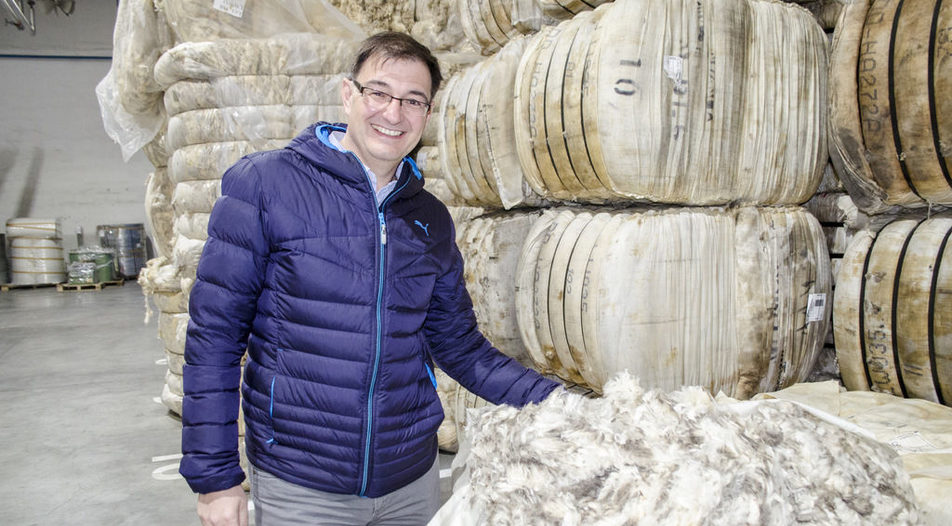• Automotive parts producers grow most rapidly among manufacturers.
After several years of absence from the Capital TOP 50 ranking of fastest-growing companies in Bulgaria, companies from the sectors of fuels and metallurgy made a triumphant comeback in 2017. A fifth of the companies that grew their revenue most substantially last year are producers and traders of fuels. Approximately the same number of companies active in metal production and trade recorded a particularly fast speed of growth during the period under review.
The top 50 fastest growing firms also include construction companies whose business has been reinvigorated after a long spell of slow activity, as well as companies from the sectors of trade and agriculture. The top spot is occupied by a textile producer - the local manufacturing plant of Australian company Lempriere Wool, which opened in Sliven in 2016.
To make it to the list of the fastest growing companies in 2017, a company must have increased its revenue by at least 28.66%, compared to 19.8% in 2016 and 28.85% in 2015.
Holding the position
The 50 most rapidly growing companies among the 300 biggest companies by revenue in Bugaria achieved an average revenue growth rate of 46.59% in 2017. The result is almost identical to the rate of growth of 46.2% achieved by the leading 50 during the prior year but represents a substantial increase compared to the average growth rate in the total ranking, as the 300 companies expanded their business by an average of 13%, while the first 100 of them achieved revenue growth of 14%. The pace in the top 50 group was set mostly by the rise in the international prices of oil and metals, with a substantial number of companies from these sectors present among the top 100 ranked.
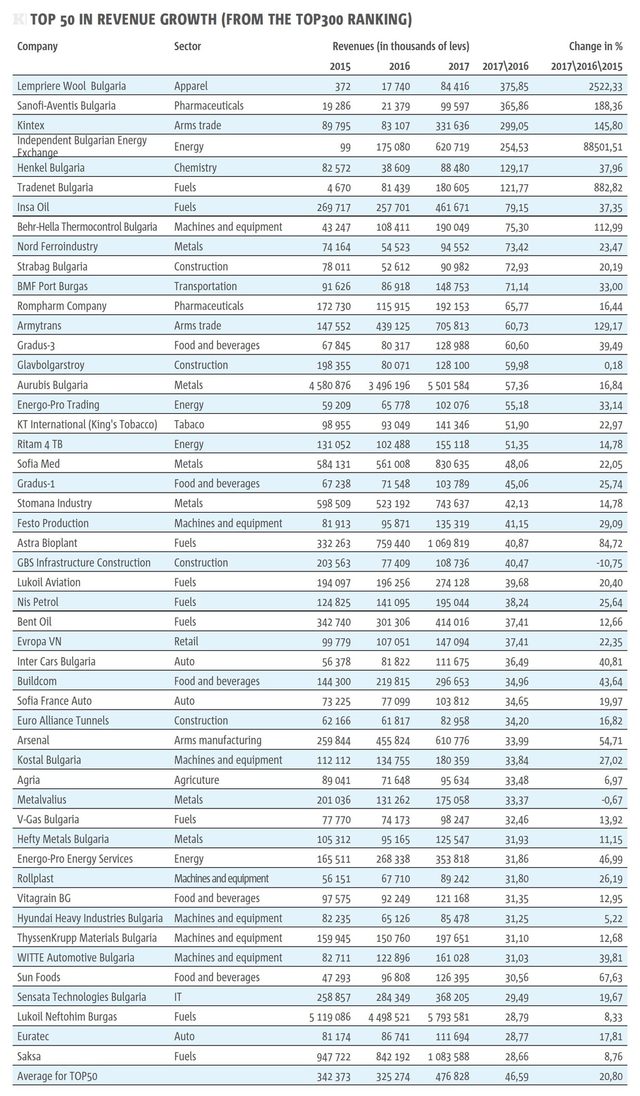
Despite that, there is a slight drop in the number of representatives of the group of 100 biggest companies by revenue in the ranking of the 50 fastest-growing companies in 2017 - 16, compared to 18 in 2016.
The average revenue growth rate of the companies ranked in positions 101 to 200 is 14.3%. The group of companies ranked in positions 201 to 300 in terms of revenue generated in 2017 sent 19 representatives to the group of the 50 fastest-growing business. The average rate of revenue growth in the group 201-300 is 5.9%. Data on the top 300 biggest companies by revenue in 2017 was used to compile the ranking of the most dynamically growing 50 of them.
In nominal terms, the combined turnover of the 50 most dynamic companies soared to 23.8 billion levs in 2017, compared to 10.97 billion levs in 2016 and 11.09 billion levs during the prior year.
Starting in 2015
The number of companies that achieved three-digit revenue growth rates in 2017 also rose - to six from five in 2016, returning to the level of 2015. The Bulgarian Independent Energy Exchange, which opened up for business in 2016 and has seen brisk trading on its platforms since last year, is also part of this group. Starting from zero revenue in 2016, the IBEX recorded revenue of 620.7 million levs in 2017, up 254.5%. Aside from this one-off effect, one should also note that all volumes traded on the exchange are entered as revenues in the company statement. Therefore, IBEX's revenue will certainly keep growing substantially and probably exceed one billion levs in 2018, as all electricity producers will be selling their full output on the free market, starting from the second half of the year.
The start from zero also explains the three-digit growth rate achieved by the leader in the ranking of the fastest-growing companies, Lempriere Wool. The textile producer opened for business in 2016 and by its second year on the market it had already entered the list of the 300 biggest companies by revenue in the country. The factory located near Sliven, in southeastern Bulgaria, is Lempriere's third production facility outside Australia and its first in Europe. The factory (an investment of 10 million euro) has processing capacity of 500 tonnes of wool per month, with around 80% of output designated for export. In 2017, the factory's revenue grew by 379% to 84.4 million levs, making it the fifth largest in Bulgaria's textile sector.
Another of the fastest growing companies, Tradenet Varna, started its business at the end of 2015. Tradenet Varna has been used by Veselin Mareshki, an MP and leader of populist Volya party, to develop his low-cost chain of filling stations VM Petroleum. The company, owned by his mother Veska Mareshka, already operates 16 gas stations and ranks 16th in the fuels sector, with a revenue of 180.6 million levs in 2017, up 122% on 2016.
Last year's ranking featured the manufacturer of automotive air conditioning systems Behr-Hella Thermocontrol (BHTC) Bulgaria, whose factory in the industrial zone of Bozhurishte on the outskirts of Sofia opened its doors in the spring of 2015. In 2017, the local unit of Germany's BHTC was once again among the 10 fastest growing in Bulgaria. An expansion project launched in May 2018 will almost certainly result in at least doubled production capacities, which certainly means that the company will be among the champions in the 2018 ranking as well if the project goes according to plan.
Considering the above, the companies that have been operating on the Bulgarian market for the longest period of time and have shown a sustained, three-digit rate of growth from 2015 to 2017 are just Sanofi Bulgaria and Kintex, holding the second and third place in the top 50 ranking for 2017. Sanofi owes its success to the business consolidation of the French pharmaceutical concern in different segments - innovative medicine sales, rare disease treatments, vaccines and generic medication. As a result, Sanofi Bulgaria grew its revenue by 365.86% in 2017, to 99.6 million levs.
In the case of state-owned arms trader Kintex, the jump in revenue in 2017 is probably due to the strong book of orders of weapons manufacturer VMZ - Sopot in 2016. VMZ was among growth leaders in 2016 Capital TOP100 and based on the fact that arms contracts are usually concluded for certain volumes, which often take more than a year to manufacture and deliver, part of VMZ output manufactured in 2016 was probably exported in 2017. Kintex increased its revenue by 299% in 2017, to 331.6 million levs.
The local subsidiary of German chemical consumer goods producer Henkel is another well-known entity among the companies with a three-digit increase of revenue. Henkel Bulgaria grew its revenue by 129% to 88.5 million levs in 2017, recovering its position held two years earlier, when revenue came in at 82.6 million levs. The dynamics of the results achieved in the last three years are due to intra-group restructuring of activities.
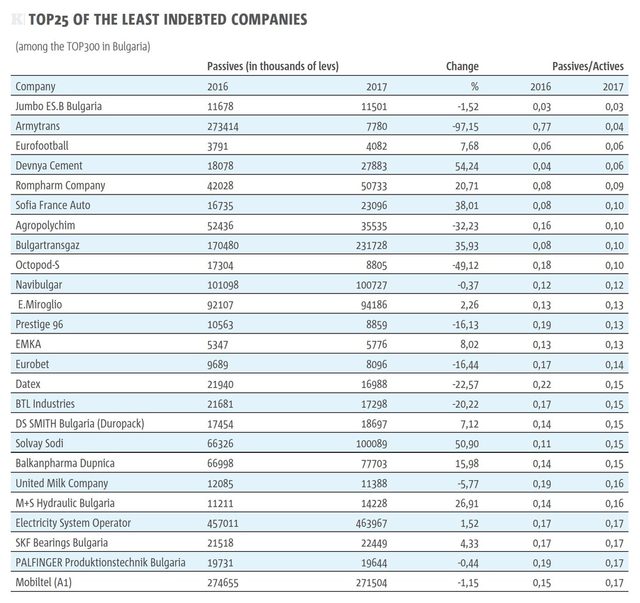
More stories about growth
Revived consumption, increased demand for property and availability of EU-funded projects explain the revenue growth in many of the most dynamic companies. In this group, construction company Glavbolgarstroy and its subsidiary GBS Infrastructure Construction are gradually recovering part of their lost positions, mainly on the back of the projects for building a transit natural gas pipeline to Turkey, the Struma motorway section from Kresna to Sandanski and the Plovdivtsi dam. The situation is similar in the case of another big player in the sector, the Bulgarian arm of Austria-based Strabag, which started the construction of a Congress Center and Black Sea Research and Control Center in Burgas in June 2018, a project valued at 14 million levs.
The fluctuations of international prices of metals in the last few years determined the revenue of companies such as Sofia Med, Stomana-Industry, thyssenkrupp Materials Bulgaria, Metalvalius, Nord Ferroindustry and Hefty Metals (formerly Nadin), as well as the vice-champion of Capital TOP100 - Aurubis Bulgaria. The copper processing plant in Pirdop says that the total revenue used for the purposes of the ranking includes both the proceeds from hedging operations and exchange rate fluctuations. However, the turnover from the plant's core operations also grew at a similar rate of 55% to just over 5.0 billion levs.
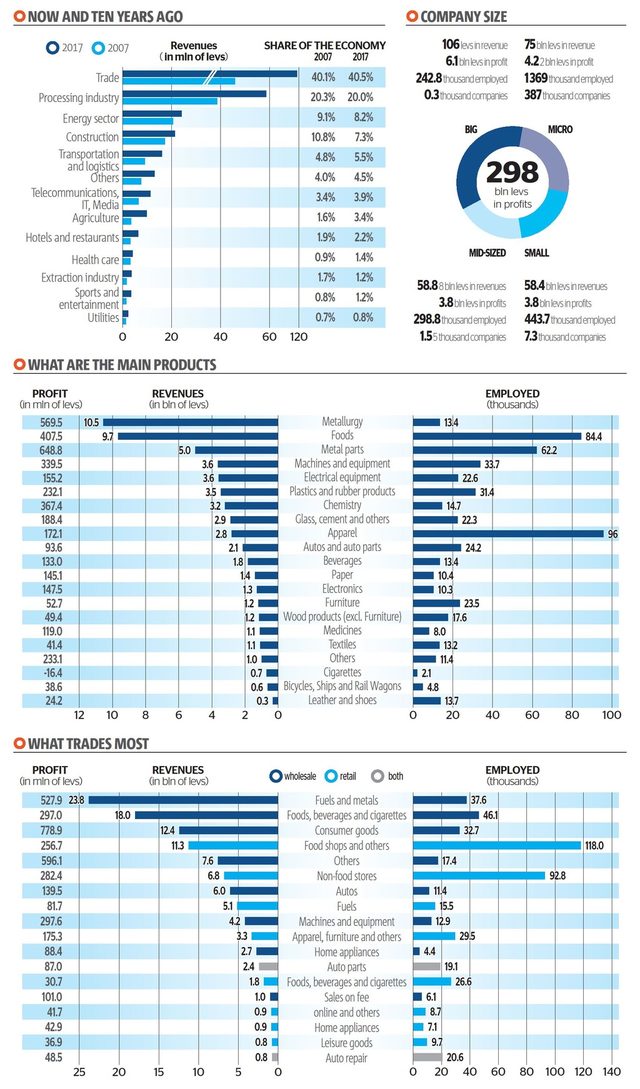
For most of the companies in the Top 50 ranking, the growth of business is a lasting trend. They include representatives of the weapons sector, which besides Kintex include Arsenal manufacturer and private merchant Armytrans. Companies from the automotive sector such as the importers of Peugeot and Skoda (Sofia France Auto and Euratec), and car parts supplier Inter Cars also report a strong period. The business of manufacturers such as Festo Production (automotive components), Kostal Bulgaria (steering column modules), Witte Automotive Bulgaria (locking systems), Sensata Technologies Bulgaria (sensors for the automotive industry) and Rollplast (aluminum and PVC joinery) is also steadily growing.
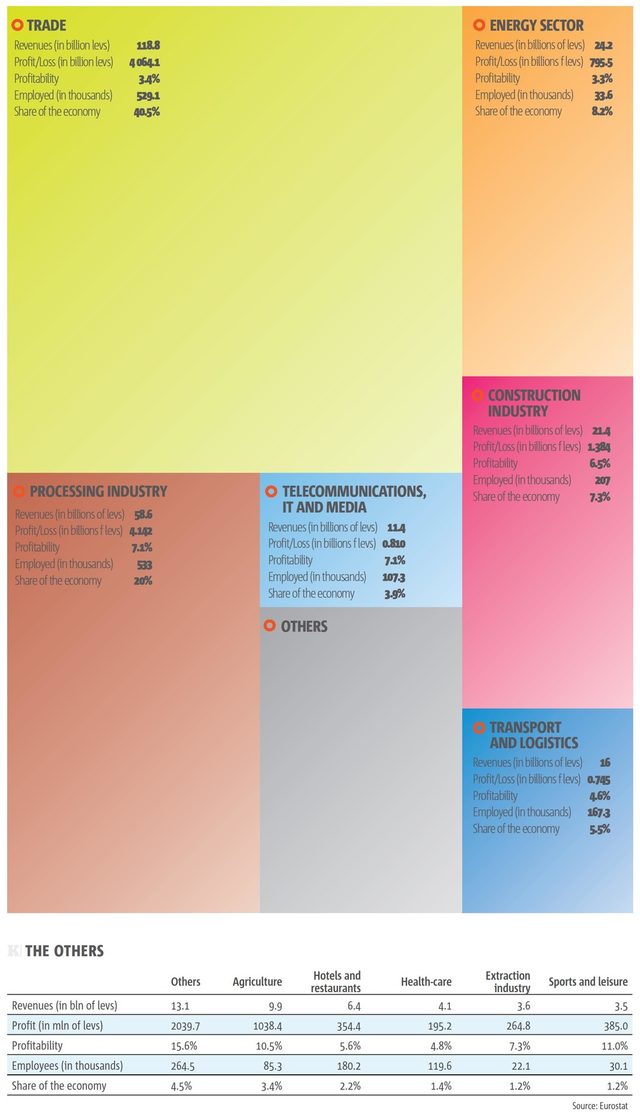
• Automotive parts producers grow most rapidly among manufacturers.








